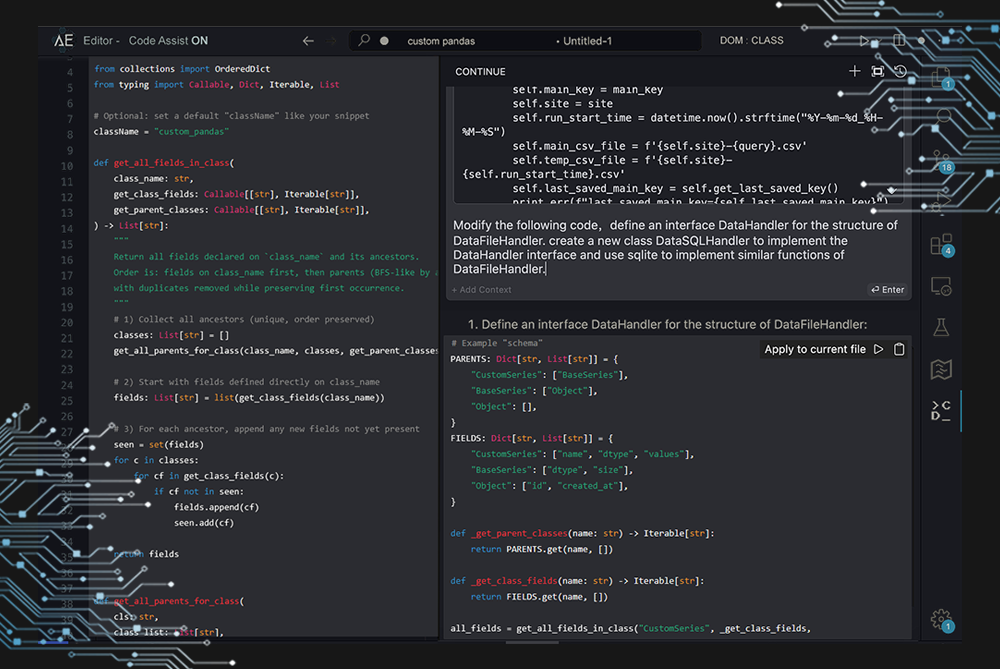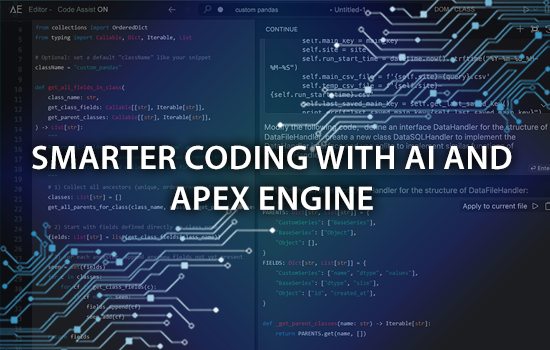Smarter Coding with AI and Apex Engine
Coding Made Easier, Faster, and Smarter
As developers, we know that the real challenge of building worlds and applications is not just having big ideas. It is managing the details, keeping data consistent, linking objects correctly, and avoiding wasted time on repetitive debugging. Apex Engine’s Python Code Assist is being designed to make these details easier, faster, and more reliable. The goal is to let developers focus on creativity while AI helps handle the structure.
DOM and GOM: The Foundation of Flexibility
From our legacy work, we know the power of separating the DOM (Data Object Model) and GOM (Game Object Model). This approach gave HeroEngine its real-time collaborative flexibility, and it remains central to Apex Engine’s design.
The DOM is where definitions live: classes, fields, enums, and associations. These define the what of your data, structured independently from scripts. Historically, the DOM could be modified visually through a DOM Editor or directly with the CLI, with changes instantly available for use in scripts. This same principle continues in Apex Engine, ensuring developers always have clear definitions to work from.
The GOM is where data becomes action. Nodes based on DOM definitions form the actual objects in the world. On the server, these nodes are persisted or temporary depending on their purpose. On the client, lightweight nodes keep performance high while still reflecting the same structures. Together, the DOM and GOM provide a consistent way to move from data definitions to live, interactive worlds.
This separation of definition and instance is what makes Apex Engine scalable, collaborative, and adaptable across industries.
From DOM Editor to Python Editor
In HeroEngine, the DOM Editor was a specialized tool for creating and editing definitions visually, with those changes instantly available in scripts. For Apex Engine, we are expanding that concept into something broader and more versatile: the Python Editor.
The Python Editor will be a tabbed editing environment that allows developers to open or create scripts for the DOM, GOM, GUI, States System, and other core functions of the engine. Instead of being limited to a single workflow, the editor will unify multiple scripting approaches in one place.
Apex Engine will support Python, QML, XML, and JSON, making it easier for teams to work with whichever scripting language best fits their role or task. This flexibility ensures developers, technical artists, and designers can collaborate more effectively without being constrained to a single format or editor.
How Python Code Assist Fits In
The upcoming Python Code Assist will be tightly integrated with both the DOM and GOM, helping developers write better code faster:
- Context-Aware Suggestions: AI will suggest snippets based on existing DOM definitions and GOM nodes, saving time spent looking up class names or field types.
- Error Detection: If code references the wrong field, class, or node type, the assist can highlight issues before they break a workflow.
- Learning from Projects: Over time, the AI will adapt to project-specific structures, learning how your DOM and GOM are used so its recommendations match your team’s patterns.
- Seamless Testing: Code can be written, validated, and tested in the live collaborative environment without breaking the creative flow.
Why We Are Building This
We learned from our community that efficiency matters. Teams want tools that remove friction without removing control. The DOM and GOM are powerful, but they can be complex for new developers or large teams. The Python Editor, paired with Python Code Assist, is being designed as a co-pilot that understands these systems under the hood. This will help teams get productive faster while reducing the learning curve.
What It Means for Our Clients
As developers, we know that the real challenge of building worlds and applications is not just having big ideas. It is managing the details, keeping data consistent, linking objects correctly, and avoiding wasted time on repetitive debugging. Apex Engine’s Python Code Assist is being designed to make these details easier, faster, and more reliable. The goal is to let developers focus on creativity while AI helps handle the structure.
For developers and teams, this means:
- Recognizable languages like Python, QML, XML, and JSON reduce the learning curve.
- Teams gain a familiar entry point with abundant resources, which helps developers adapt quickly.
- Faster onboarding for new members unfamiliar with DOM and GOM structures.
- More reliable coding with AI-driven validation against definitions and object models.
- Less time lost to debugging and more time spent building.
- A coding workflow that ties directly into Apex Hub, allowing code-driven changes to flow into team updates and collaboration tools.
- Because we listened to our clients, combining familiar scripting with AI Code Assist means teams can jump right in, stay productive, and gradually grow into the more advanced systems as they go.
TGS Tech Insight
The combination of DOM and GOM with a multi-language Python Editor and AI-driven Code Assist is more than a nod to our history. It is the foundation for the future, where structured data and live objects meet intelligent coding tools. Apex Engine is being built to ensure developers are always supported by smart, adaptive systems that keep them focused on what matters most: creating.







